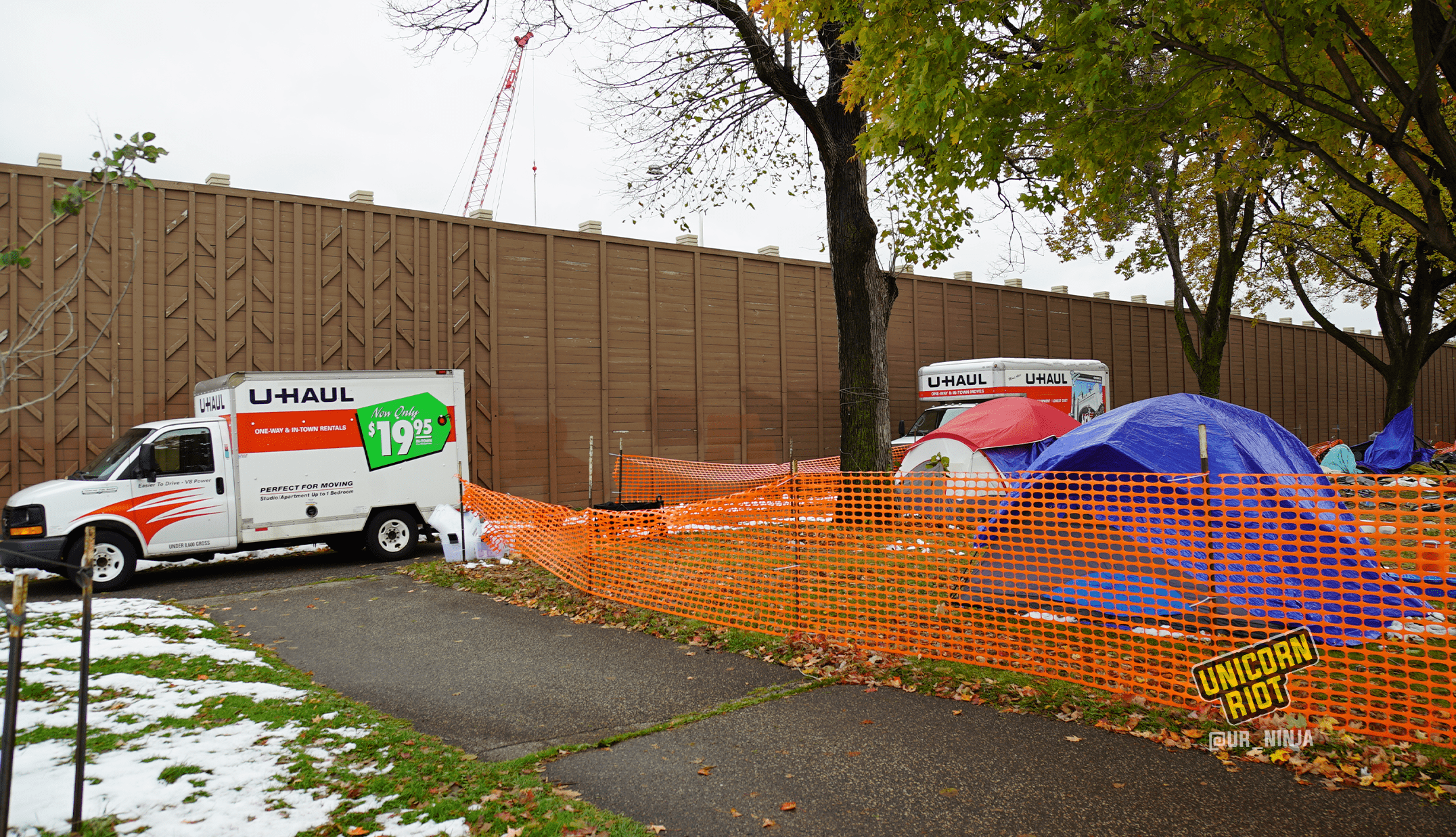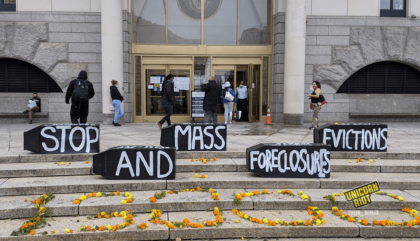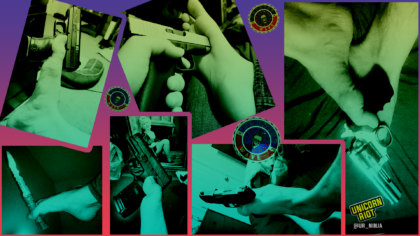Minneapolis Prioritizing Park Sweeps Over Sheltering the Unhoused
Minneapolis, MN – The ongoing housing crisis in the Twin Cities has been made more urgent by an early major snowfall. Residents of tent camps across Minneapolis have come to understand that elected leaders have neither a plan to renew the camps’ temporary permits nor a timeline to provide adequate shelter to all who currently need it. What officials have chosen to prioritize is having all city parks cleared by the end of October.
Volunteers across the Twin Cities have stepped in to provide mutual aid to their neighbors, assisting camp residents with tasks such as attaining meals, getting rides to appointments, moving to a different location, or standing alongside them as they resist violent displacement by police. In each case, the aid provided by community members is based on the needs of the people on the frontlines — those residents of Minneapolis experiencing housing precarity and instability.
As of Tuesday, October 27, five camps are listed as still having active permits on the Minneapolis Parks and Recreation Board (MPRB) website. (Other nameless, unpermitted camps remain throughout the city.) Camp volunteers report that MPRB employees have come through all the camps reminding residents that they need to clear out, and that many residents have voluntarily depopulated those locations in anticipation of a police eviction.
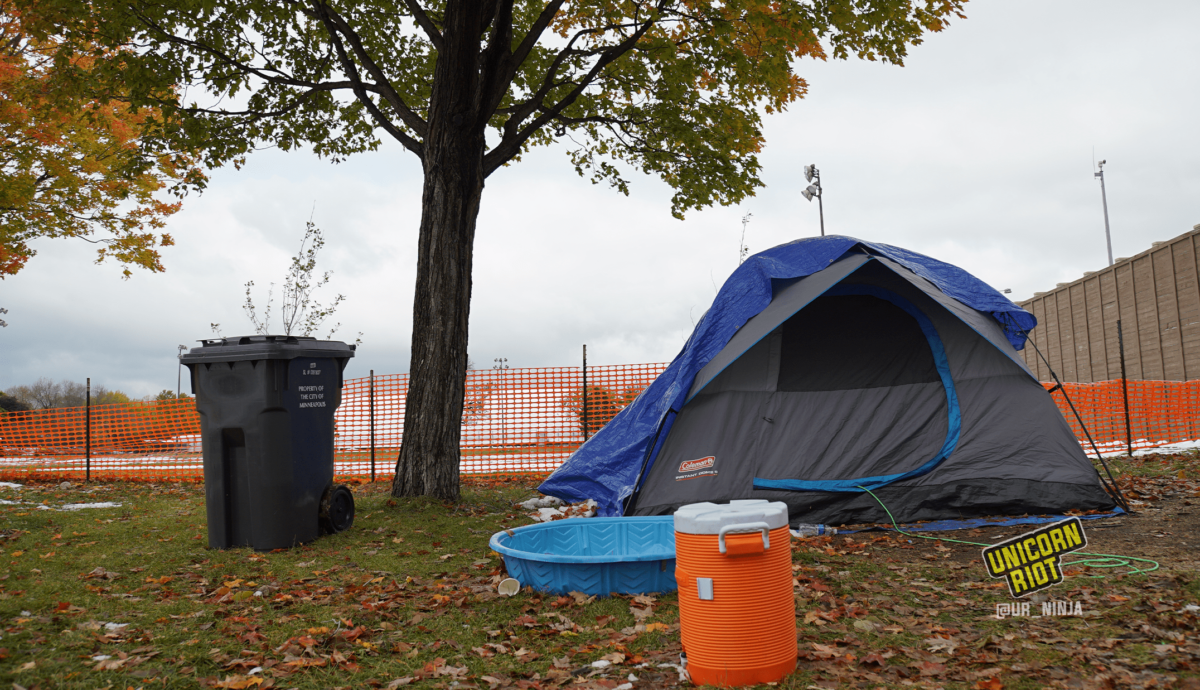
A lawsuit was filed in federal district court on October 19, arguing that the sweeps of public parks are “illegal and unconstitutional.” The class-action suit alleges Fourteenth and Fifteenth Amendment violations through the seizing and trashing of residents’ belongings, and seeks an immediate, temporary restraining order against what it calls “misconduct” by law enforcement agencies.
“This case is about the defendants destroying plaintiff’s property without due process and upending their life simply because they are homeless,” argued attorney Rebecca Stillman, and that police discarding tents/living essentials/sentimental property is a seizure under 4th Amd.
— Tony Webster (@webster) October 22, 2020
The plaintiffs include seven Minneapolis residents filing on behalf of themselves and other “similarly-situated individuals,” as well as Zakat, Aid and Charity Assisting Humanity (ZACAH), a Muslim-run grassroots organization which has been temporarily sheltering unhoused people in hotel rooms. Mid-Minnesota Legal Aid, a non-profit which provides legal assistance to people with low income, and the American Civil Liberties Union (ACLU-MN) helped file the suit. MPRB Superintendent Al Bangoura, Minneapolis Mayor Jacob Frey, and Hennepin County Sheriff David Hutchinson are named as defendants, among others.
Minneapolis’ Parks and Recreation Board (MPRB) issued a public statement in response on October 19, describing itself as having been “humane, lawful, and measured in its responses to temporary encampments in the parks.” The statement concluded by focusing on the as-yet-unmet need for dignified, safe shelter by people experiencing homelessness.
“Camping in parks now is simply not humane or safe. Three people have already died at homeless encampments in Minneapolis this year.“
— MPRB Statement in Response to ACLU Lawsuit
During a press conference on October 19, Dr. Bilal Murad, President of ZACAH, said that it is the government’s responsibility to ensure everyone has somewhere safe to stay over the winter. Murad added that not only did park and city police destroy residents’ personal belongings, they were also responsible for the “theft of psychological safety” and for the annihilation of the communities that had been self-organizing at evicted camp locations.
Some displaced unhoused residents have been sheltering in rooms temporarily provided by ZACAH at an Extended Stay America hotel in Bloomington, MN. Hennepin County recently decided to use CARES Act funds to purchase that property, into which the county plans to move other vulnerable unhoused residents considered most at-risk to COVID-19. (The county has since decided against purchasing that property “due to timing constraints associated with CARES Act funding and the complexity of a deal of this size.”)
Hennepin County’s incentive is to lower its room cost per resident by moving residents from a private business to county-owned property. Unhoused residents currently at that hotel have explained that the county is preparing to displace them in order to make way for others in need. Residents and advocates alike emphasized that it makes little sense to forcibly turn out some homeless people on behalf of others, when all involved share similar needs for safe and private shelter.
On October 26, one week after the lawsuit against Hennepin County et al, an open letter was sent to local elected leaders, challenging them, “if you are really trying to care of the homeless, do not force us to leave the extended stay on November 1.” It was signed by Freedom From The Streets co-founder Junail Anderson, lawsuit plaintiff Nadine Little, and six residents of the Extended Stay, among others.
Hennepin County has purchased two other buildings with CARES Act funds, both in Minneapolis: the Metro Inn Motel on south Lyndale Avenue, and a building in Stevens Square owned by the Volunteers of America. A spokesperson for the county, Kyle Mianulli, said that before residents will be allowed to move in, some repairs and updates are needed. Hennepin County District 3 Commissioner Marion Greene did not respond to requests for comment on the county’s timeline for those repairs.
Before the COVID-19 pandemic, housed and unhoused residents of Minneapolis alike voiced dissatisfaction with group shelters because of the lack of privacy and dignity afforded to people who shelter there. With infection numbers continuing to climb and a minimum distance of six feet recommended between each person, to expect dozens of already-vulnerable individuals to sleep indoors in a single large room is to quietly force homeless people accept a higher risk for exposure to a deadly virus.
“Most of us would rather be in the streets than the shelter. That’s why you saw hundreds of us in parks this summer.“
— open letter to Hennepin County, Mayor Frey, Governor Walz, and the Minneapolis City Council
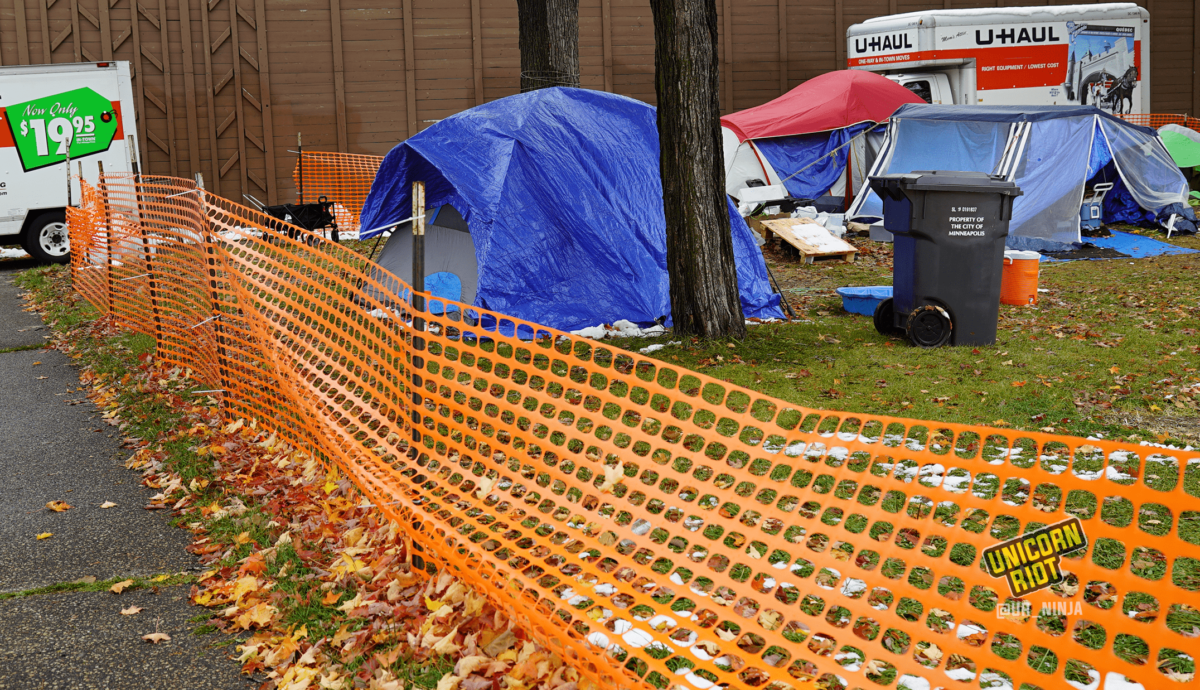
As of Tuesday, October 27, half of The Mall camp has reportedly been evicted. Part of what makes life challenging for residents of these encampments is that they don’t know when exactly police will show up in force demanding that they leave. Community members that have been providing mutual aid to unhoused residents say that they have received no clear information about when city employees might return to the parks with bulldozers, as they did at sanctuary sweeps two months ago.
What is clear is that group shelters are not an acceptable solution to many unhoused Minneapolis residents. “If you want to talk long-term solutions, don’t talk shelters. We’ve already been there,” reads one slide.
Written first on a list of “solutions we actually want” is for the county to buy hotels which provide “basic necessities that every human being on Earth deserves“: running water, shelter from the cold, a locked door for privacy, a safe place to store belongings, and access to electricity.
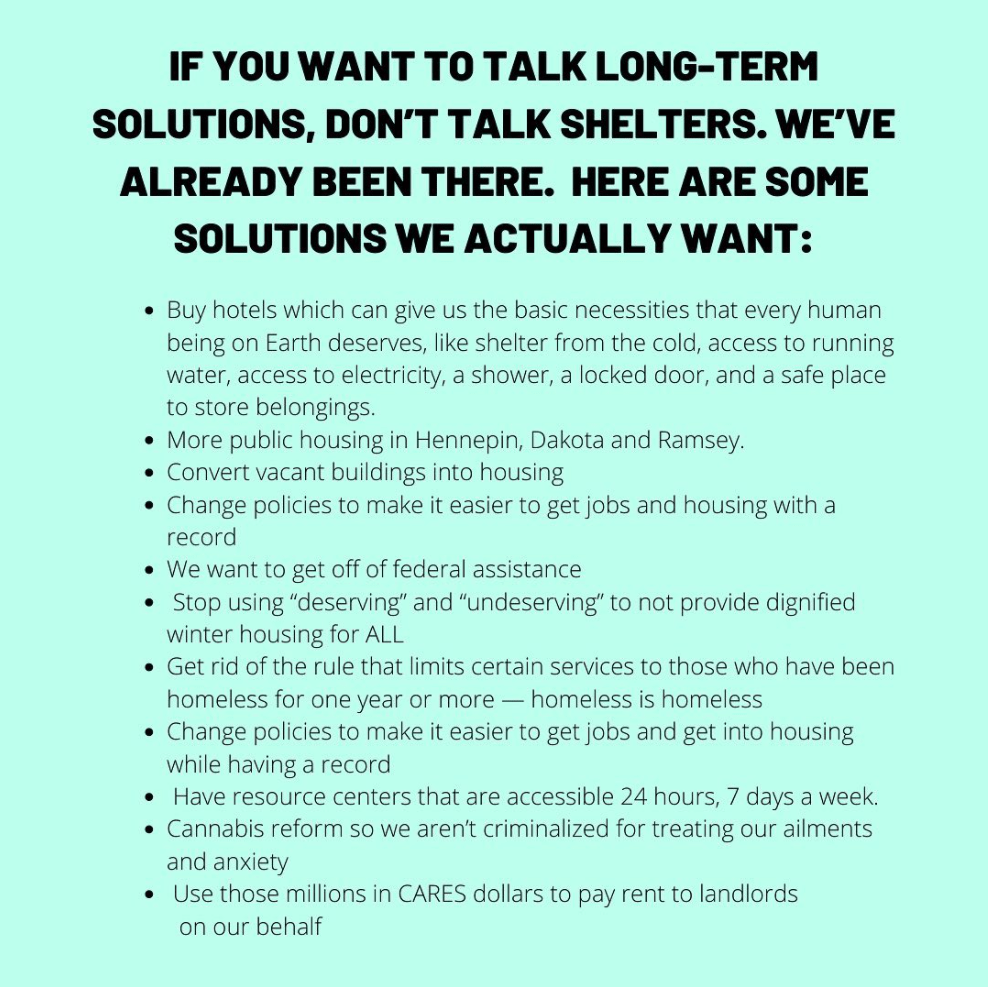
The letter ended by calling the recipients to the Extended Stay Motel on Sunday, November 1 at 11:00 a.m. to support residents and to discuss “plans to fund hotels and long term solutions.” A goal of 1,600 signatures has been halfway achieved by the end of the day on October 27.
Though Hennepin County’s timeline for renovating those properties remains unclear, the timeline of both the city and the county has been to have the public parks cleared by the end of October — just in time for winter in Minnesota, when most Twin Cities residents are unlikely to want to use the public parks.
Unicorn Riot will continue to provide updates on the Minneapolis sanctuary movement, both permitted and unpermitted.
Photographs of the tent residence in this article were taken with permission of the owner.
Updated October 29, 3:15 p.m. CDT: this article has been updated to reflect a news release from Hennepin County stating that the Extended Stay America hotel in Bloomington would not be purchased with CARES Act funds.
Please consider a tax-deductible donation to help sustain our horizontally-organized, non-profit media organization:

Unicorn Riot's 2020-24 Unhoused Crisis in Minneapolis:
- Crisis of the Unhoused – Landing Page for Unicorn Riot Coverage
- Camp Nenookaasi Burns Down, Finds New Home - Feb. 29, 2024
- Camp Nenookaasi Pushes Debates in Minneapolis Around Encampments [Video] - Feb. 26, 2024
- Camp Nenookaasi Brings Minneapolis’ Policies Against its Unhoused Residents to the Forefront - Feb. 7, 2024
- Camp Nenookaasi, a Beacon of Hope to the Unhoused, Faces Eviction - Dec. 14, 2023
- ‘Wall of Forgotten Natives’ Encampment Revived After Five Years, Gets Evicted - Sept. 4, 2023
- Minneapolis Continues Encampment Evictions, Displacing Hundreds in May - May 26, 2023
- Samatar Encampment Eviction Leaves 100 Displaced Mid-Winter - January 24, 2023
- Dozens of Police Evict Quarry Encampment - January 2, 2023
- Quarry Encampment Faces Eviction in Minneapolis - December 28, 2022
- Three Encampments and Halfway House Evicted, Displacing Hundreds - October 12, 2022
- Personal Belongings Trashed as Minneapolis Encampment Evicted - July 22, 2022
- Minneapolis Community Resists Encampment Eviction - July 20, 2022
- Southside Minneapolis Encampment Faces Eviction Threat - June 28, 2022
- Eviction Defense Successful Despite Aggressive Contractors - June 9, 2022
- Uptown Streets Blocked During Protest Against Police Attack on Houseless - March 23, 2021
- Five Arrested as Minneapolis Police Attempt Raid on Near North Houseless Encampment - March 23, 2021
- Homeless Tenants Union: Unhoused Self-Advocacy in the Twin Cities - February 17, 2021
- Winter of Coronavirus: Seeking Shelter in Minneapolis During COVID–19 - December 14, 2020
- Unhoused Community Forms Tenants Union, Constituents Protest at Commissioner’s Home - November 11, 2020
- Minneapolis Prioritizing Park Sweeps Over Sheltering the Unhoused - October 29, 2020
- ‘No KKKops, No Pipelines’ Banner Dropped in Minneapolis - October 6, 2020
- Reclaimed Space Sprouts From Uprising’s Embers - September 28, 2020
- Peavey Park Sanctuary Homeless Camp Evicted in Minneapolis - September 24, 2020
- New Month Brings Added Urgency To Minneapolis’ Housing Needs - September 2, 2020
- Sanctuary Camp Residents Pressured To Move, No Housing Solution In Sight - August 22, 2020
- Minneapolis Police Sweep West Powderhorn Encampment, Pepper Spray Defenders - August 15, 2020
- Authorities Visit Loring Park Tent Encampment, Bring Eviction Scare - August 10, 2020
- Minneapolis’ Unhoused Speak Out Against Years of Evictions - August 3, 2020
- Minneapolis Park Police Displace Sanctuary Encampment - July 22, 2020
Follow us on X (aka Twitter), Facebook, YouTube, Vimeo, Instagram, Mastodon, Threads, BlueSky and Patreon.
